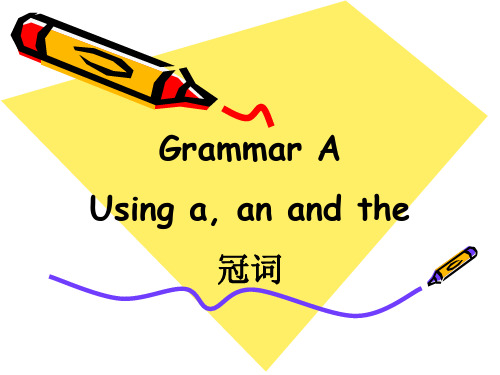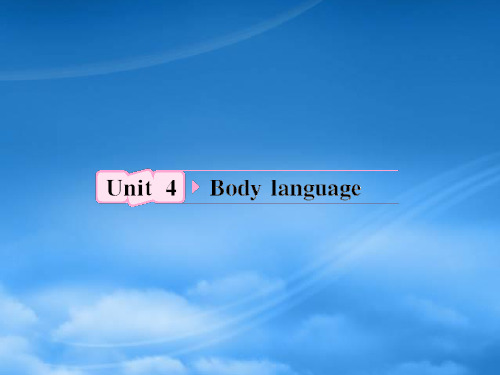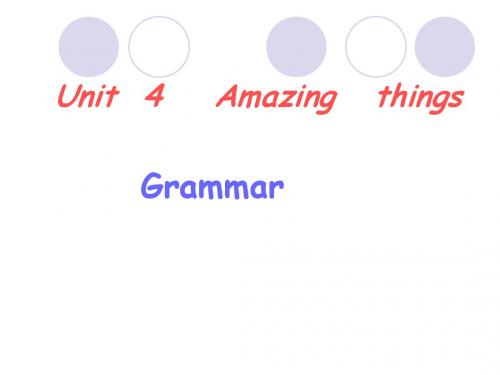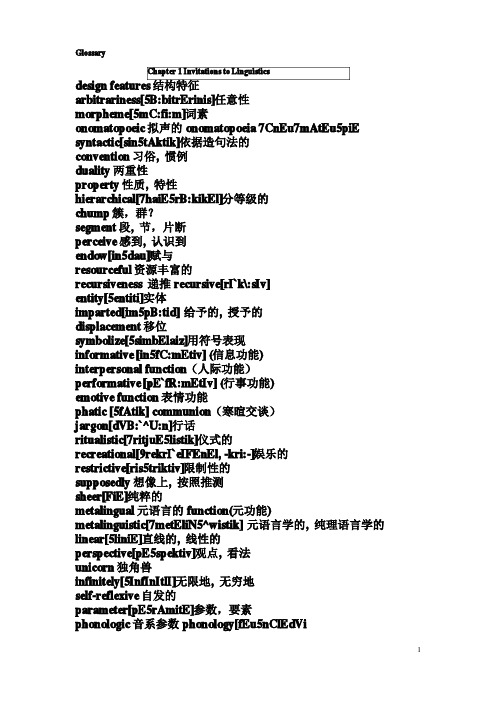7B chapter 4 language代词
牛津深圳版 7b chapter 3 language

C.many good news D.two news 3. There is ____ oil in the bottle. Can you buy some for me, Jim? A. few B. a few C. a little D. little
可数名词 规则变化 单复数变化规则 不规则变化
Exercise
不可 数名 词
meat milk tea water jam rice coffee
只有单数没有复数。 不可用a/an修饰,但 能用some 修饰。
Exercise (Workbook P29 B)
complete the sentences with a/an or some 1.I asked you ___ question. Please give me ____ a an answer. 2.Oh, dear! I can’t use the blackboard. Please bring me some chalk. _____ 3.There is some litter on the grass. ____ 4. I’d like ____ drink. Please give me some orange ___ a juice. a 5.You don’t have to stand. Let me find you ___ chair. some a 6. We need _____ flowers. Please buy ____ bunch from the market. some a 7. I need _____ medicine. I have ___ terrible cold. An some 8._____ insect bit my arm. I need ___ cream
译林英语7B Unit 4grammar精品公开课课件

特殊词:
a usual boy ; a useful book ; a university ; a one –leg dog an uncle ; an umbrella an honest boy ; an hour ; 字母前用an “a , e , i , o , f, h , l , m , n , r,s,x”
Discuss in groups:
How to use “a” or “an”
a panda a monkey a bridge an elephant an apple an open area
结论2:a用于辅音音素开头的词前, an用于元音音素开头的词前。
小试身手:用a或an填空
a an a lion ___bird ___ ___orange a an old man an “L” ___giraffe ___ ___ an ___ a “u” ___umbrella an interesting book an ___ ___ hour an honest boy ___ 注意:an是放于元音音素前,而不是元 音字母前。
the 1.We live on ___third floor of the tall building. The 2.____Whites are preparing for the coming 用于姓氏复数形式前,表示某一家人 Thanksgiving Day. the 3.My cousin ,Amy,like playing ____violin. 乐器前 the 世界上独一无二的事物 4.___earth goes around ____sun. The the 5.I believe you are ____best singer . 形容词最高级前 The 6.____rich should try their best to help 某些形容词前,表示某一类人 the ____poor.
第四单元课文知识点

1. The five senses are hearing, smell, sight, taste and touch. Match them with the pictures below.
sight
hearing
taste
smell
touch
2. Which part of the body above is often
另外, lead还有两个常见的句型:
a. lead to (通向; 导致); b. lead sb. to sth. (引起某人做某事)。
The path _________ the village.
Which horse is ___________?
Too much work and too little rest often _______ illness . We lost our way and a little girl l___ us to the nearest hotel.
牛津深圳版 七年级 7B Chapter 4
A What do you know about…? We have five senses and without even one of them, life is difficult. Try this quiz to find out how much you know about them.
新课标人教版选修七Book7-Unit4-Language-Points

B. It’s up to you
C. All right
D. Glad to hear that
2. It’s not up to you to tell me how to do my job.
__还__轮__不__到__你__里_告__诉__我__怎__么__做__我__的__事_____
3.The other day I was showing the boys the weekly chemistry experiment when, before I knew it, the mixture was bubbling over everywhere!
Book 7 unit 4 Sharing
Language points
• Learning goals: • 1.To learn the useful expressions and
sentence structures in the reading. • 2.To enable students to use language points
Jane is back in May, _b_y_w__h_e_n_ the new house should be finished.
简五月份回来,到那时,新房子就会建好了。
5. 汤贝的父亲,莫卡普, 把我们带到他的家里。 那是一个低矮的竹屋, 屋顶上伸出一簇茅草
Tomber’s father, Mukap, led us to his house, a low bamboo hut with grass sticking out of the roof--- this shows it’s a man’s house.
否则
新课标人教版选修七Book7 Unit4 Using Language

What do they really need?
.au/giftcatalogue /index.shtml
Part I 1. The purpose of the Internet Page is to ____ A A. let people give an unusual gift to the poor B. let people get an unusual card C. let people learn something useful D. let people make money
• 世界的改变不是因为那些因循守旧的人,而是那些内心 有想法的人推动的。
• (2)Not you but she is_wanted on the telephone. 电话里找的是她而不是你。
策划:《学生双语报》
13
Hale Waihona Puke • Exercises:1 The people in the refugee camp are ________ food and medicine. • A.in need of B.in praise of • C.in memory of D.in search of • 2 It is often said that the joy of traveling is ________ in arriving at your destination ________ in the journey itself. • A./;but B./;or C.not;or D.not;but • 3 译: 几年来,老人自己过着简朴的生活却给山区的孩 子捐钱多达50万元,感动了几十万人。 • The old man is living a simple life but he has donated as much as 50,000 ¥ to the poor children in the mountainous area, which has moved millions of people. • •
译林版7B期中复习(Unit1-4短语词组句型语法)

译林版7B期中复习(Unit1-4短语词组句型语法)7B知识点总结Unit 1 Dream homes一、词汇短语1.dream n/v:dream to do sth 梦想做某事;dream of…梦到…2. next to prep.在…旁边,仅次于=beside=near3. capital n/adj: 大写字母,资本/大写的,顶好的;the capital of …的首都(省会)4. have fun=have a good time=enjoy oneself 玩的开心have fun (in) doing sth5. enjoy a cup of tea 喝杯茶6. in the centre of 在…的中心7. share vt/n 合用,分享;份,份额share sth with sb; a share of 一份…8. ▲own adj/vt自己的; 拥有(owner n 拥有者) of one’s own 属于某人自己的;on one’s own=alone 独自的9. on the seventh floor 在第七层10. look out at 向外眺望;look out=be careful 小心,当心;look out of 从…向外看11. be different from 与…不同be the same as 与…相同12. be full of =be filled with 满是…13. some day 将来有一天,总有一天14. call v/n 打电话,拜访call sb=telephone sb=ring sb;give sb. a call=call sbcall sb back 回电话call on sb拜访某人;call at s.p参观某地15. message n.可数名词“消息,讯息”take a message稍口信leave a message 留口信16. at the foot of 在…脚下17. more than=over 多于…18.在足球场on the football field 在羽毛球场on the badminton court在游泳池里in the swimming pool19. invite vt邀请invite sb. to do sth ;invite sb to +地点/场合invitation n.二、重点句型1. Would you like sth/to do…? 肯定回答Yes,I’d love/like to ;否定回答No,thanks;Yes,I’d like to,but2. 电话用语(1)“电话问候”Hello/Hi; see you/bye/goodbye(2)找人May/Can I speak to…, please?或I’d like to speak to…, please?(3)请问您是哪位?Who’s calling? /Who’s speaking? /Who’s that?(4)自报家门如果你就是对方要找的人,那么你可以说:Speaking./This is…speaking.(5)稍等片刻Hold on,please./Wait a minute, please./One moment, please.(6)转告某人接电话There’s a telephone call for you, Amy./You’re wanted on the phone.(7)找不到接听的人,告知对方I’m afraid he/ she is n ot here at the moment.I’m sorry he/ she is out at the moment.主动相助Can I take a message?3. have an area of 数字+单位=be 数字+单位in size/area 意为“有…面积”三、语法A 基数词-数量(1)21~99之间的各数词,在十位数和个位数之间加连字符“-”。
人教版高中英语必修四 Unit4 Body language-语法篇(学生版)

Unit4 Body language语法篇____________________________________________________________________________________________________________________________________________________________________要求学生掌握本单元的重点语法----动词的-ing形式作定语和状语并能熟练运用相关语法知识解决相应类型的题。
一、动词的-ing形式由“动词原形+ing形式”构成,它既是现在分词形式,也是动名词形式。
v-ing能在句中作主语、宾语、表语、定语、宾语补足语和状语,但不能单独作谓语。
其时态和语态的变化为二、动词-ing形式的作用1.动词-ing形式作定语E.g. The sleeping baby looks very beautiful. (前置定语)这位正在睡觉的婴儿看起来太漂亮了。
E.g. The man sitting in the car is waiting for his daughter.(后置定语)坐在车里的男子正在等他的女儿。
E.g. The law being carried out is to ban drunken driving.(后置定语,强调正在被执行的法律)正在执行中的这则法律旨在禁止酒后驾驶。
名师点拨(1)现在分词短语作定语时通常后置,而单个的分词作定语时可置于被修饰词的前面,也可置于被修饰词的后面。
(2)现在分词的完成时的主动及被动形式均不作后置定语。
2.动词-ing形式作状语。
(1)作时间状语。
E.g. Working in the office, the clerk heard an explosion from the street.在办公室工作时,这位职员听到街上发出了爆炸声。
E.g. Having finished her homework, the girl was busy with the thing she likes.完成了家庭作业,女孩就忙于做她喜欢做的事情。
book7-unit4-Language-Points-语言点

2. But last weekend another teacher, Jenny, and I did visit a village which is the home of one of the boys, Tombe. “do / does / did+动词原形”构成的强调句
练习: (1) 他昨天的确来这里了。
He did come here yesterday. (2) 我们确实经常骑自行车去上班。
(2) 她很快使自己适应了这种生活方式。
Sh_e__s_o_o_n_a_d__ju_s_t_e_d_h_e_r_s_e_l_f _to__th__is__w_a_y_o__f _life.
7. I loved listening to the family softly talking to each other in their language,even though I could not participate in the conversation.
8.1)Tombe told me that the can was heated to dry out the leftover food.
2)Many rivers in Africa have dried up recently. dry out 强调浸水等物的完全变干;干透 dry up 强调河流、井等干涸;使干/枯竭
结构归纳: adjust sth.to sth. 调整……以适应…… adjust to (doing) sth 适应于…… adjust oneself to... 使自己适应于…… make an adjustment (adjustments) to 对…作出调整
Chapter4 重点单词与句型

Chapte4重点单词与句型一.四会单词(会读,写,用,默)1. watch a clown show 看小丑表演2.watch a magic show 看魔术表演3.play games玩游戏4.open presents打开礼物5.sing ‘Happy birthday’唱“生日快乐”6.blow out the candles 吹蜡烛7.cut the cake切蛋糕8.next 接着9.after that 然后10.classmate同学11.get presents得到礼物12. expensive昂贵的13. take photos 照相动词原形和过去式:1. blow吹---blewe来---came3.drink喝---drank4.get得到—got5.sing唱—sang6.do(做、助动词)—did7.eat吃---ate8.have举办(派对)---had9. make做---made 10.take照---took 11.cut切---cut 12. 摆放put---put二.两会单词(会读,知道意思)1. fantastic极好的2.surprise惊喜3. chat 聊天4. change改变三.重点句型1. --Did you sing ‘Happy Birthday’? 你唱了生日快乐歌吗?--Yes, I did. 是的,我唱了。
--No, I didn’t.不,我没有唱。
2. First we played games. Next/ After that we sang ‘Happy Birthday’.首先,我们玩了游戏。
接着,我们唱了生日快乐歌。
3. Was the party fun? 派对有趣吗?4. What a surprise! 太惊喜了!5. What a fantastic day! 极好的一天!。
新牛津英语7B Unit4 Grammar

--Where’s ___ the kite? I can’t see it. a famous university in this 8 There’s ___ city. a mouth, ___ a nose, two 9 Everyone has ___ eyes and two ears. 10 Which is the biggest, ___ the Sun, ___ the the Moon? Earth, or ___ 5 Kate is ___ an English girl and I am ___ a Chinese girl. 6 –Who’s ___ the man over there? --Oh, he’s __ a friend of my father’s.
an apple . It is ________ The apple is red.
Watch and discuss in groups the difference between a and an
a panda a monkey
an elephant an apple
结论:a用于辅音音素开头的词前,an 用于元音音素开头的词前。
along
Millie is walking ______ along the road.
A cat is sleeping ___ on the balcony.
up
down
Kitty is climbing ___ up the hill. down the stairs. Daniel is walking _____
There are some fruits ______ behind the boy.
across
高考英语 Unit4《Body language》知识与要点课件 新人教必修4

重点 句型
1.Tony approached Julia,touched her shoulder and kissed her on the cheek! 2.Not all cultures greet each other the same way,nor are they comfortable in the same way with touching or distance between people. 3.With so many cultural differences between people,it is great to have some similarities in body language.
3.approach n.接近,逼近,走近;方法,步骤,途径,道路 vt.接近,建议;要求,找……商量 vi.靠近 归纳拓展 (1)at the approach of...在快到……的时候 make an approach to...对……进行探讨;向……提出要求/建议 an/the approach to sth.(待人接物或思考问题的)方法、方式、态度 (2)approach sb.on/about sth.与某人接洽/商量某事 approach to...接近,近似;约等于;做某事的方法/途径
牛津英语7B Unit4 Vocabulary课件

Homework:
1.Finish the exercise book. 2.Recite the new words.
Millie dislikes bananas. She eats very few of them. Daniel hates basketball. He never plays it.
翻译下列词组:
对……狂热 和他玩 带他散步 喜爱音乐 听音乐 她最喜爱的食物 不喜欢篮球 醒的早 对……吠 弄醒他
horse snake monkey tiger crazy about, love, fond of, like, dislike, hate
Daniel hates basketball. He never plays it.
crazy about
love fond of like dislike hate
√ 7 Sandy says, ‘Kitty ___________ (dislikes, loves) dancing. She practises every day.’
根据句意用所给词的适当形式填空
▪ There are lots of foods that Millieli_k_e_s____ (like). ▪ Daniel likesst_u_d_y_in_g__ (study) very much. ▪ Eddie hatesw_a_k_i_n_g__ (wake) up early. ▪ Andy practises football even whenriat i_n_s_____ (rain) ▪ My dog ___b_a_r_k_s_ (bark) at any stranger wchoom_e_s_____
Chapter4翻译的基本技巧

Chapter 4翻译的基本技巧1.增译法1.1增量词(名量词和动量词)1)To the east a faint pink is spreading.一抹浅红正向东方扩展。
2)I was extremely worried about her, but this was neither the place nor the time for a lecture or an argument.我真替她万分担忧,但此时次地既不不宜教训她一番,也不宜与她争论一通。
1.2.汉语中名词复数的增补1)The lion is the king of animals.百/万兽之王。
2)Fogs hid the mountain peaks.层层薄/云雾遮蔽了重重峰峦。
3)Reports of new successes keep pouring in.捷报频传。
4)Disappearances occurred with apparently increasing frequency…失踪事件/接连不断接二连三地发生,显然越来越频繁5)As soon as winter was over and the primroses began to bloom.冬天一过,迎春花竟相/便朵朵开放。
6)She warmly welcomed her guests in and brought them a cup of tea.她热情地将客人们迎了进来,然后给他们各/每人/一一端一杯水。
7)what you have been looking for, my friend, is the chance to throw yourself into the world of UniversitySocieties, and discover the huge range of activities .我的朋友,你一直在寻找的就是将你自己投身到大学社团中的机会,去发现丰富多彩的、各种各种的活动。
7B_Unit4_Grammar&study skill

be
Was he/she/it…? Yes,he/she/it was. No,he/she/it was not. Were they…? Yes,they were. No,they were not. Did he/she/it work? Yes,he/she/it did. No,he/she/it did not. Did they work? Yes,they did. No,they did not.
一般疑问句
My mother didn’t watch TV last night.
Did your mother watch TV last night?
3 一般疑问句 1)含有be 动词的一般过去时的陈述句变为一般疑问句时, 把was 或were 提前并放在句首,句型是 “Was / Were + 主语 +其他?” 回答:Yes, 主语 + was/ were / No, 主语 + wasn’t / weren’t a. ---- Was he busy yesterday? Yes, he was. / No, he wasn’t. b. Were they in Beijing last month? Yes, they were. / No, they weren’t. 2) 含有实义动词的一般过去时的陈述句变为一般疑问句时, 在句首加助动词did, 同时把句中的动词变为原形。句 型是“Did + 主语 + 动词原形+ 其他? 回答:Yes, 主语+ did. / No, 主语 + didn’t. a. Did he play tennis last week? Yes, he did. / No, he didn’t.
人教高中必修四 Unit 4 Body language 知识点学案

人教高中必修四Unit 4 Body language 知识点学案一、词性转换1.statement n.陈述;说明→state v.陈述;说明2.represent vt.代表;象征→representative adj.代表性的n.代表3.association n.社团;联系→associate v.把……联系起来4.curious adj.好奇的→curiously adv.好奇地→curiosity n.好奇心5.defend vt.保护;保卫→defence n.防御;保卫6.misunderstand vt.误解;误会→misunderstanding n.误解;误会7.simply adv.简单地;只→simple adj.简单的;单纯的8.facial adj.面部的→face n.脸9.truly adv.真实地;真正地→true adj.真实的→truth n.真实;真理10.respectful adj.恭敬的→respect n.尊敬;方面vt.尊敬,尊重二、知识点精析1. greet vi.&vt.迎接;问候greeting n. (常用复数形式)问候;祝贺;贺词greet sb.with...用……向某人打招呼①Please give my greetings to your father.①He greeted me in the street with a friendly wave of the hand.他在街上向我友好地挥手致意。
2.curiously adv.好奇地curious adj.好奇的be curious about sth. 对某事感到好奇be curious to do sth. 极想做某事out of curiosity 出于好奇①The people looked at the strange boy curiously(=with curiosity).人们好奇地看着这个奇怪的男孩。
语言学词汇

GlossaryChapter 1 Invitations to Linguisticsdesign features结构特征arbitrariness[5B:bitrErinis]任意性morpheme[5mC:fi:m]词素onomatopoeic拟声的onomatopoeia 7CnEu7mAtEu5piE syntactic[sin5tAktik]依据造句法的convention习俗,惯例duality两重性property性质,特性hierarchical[7haiE5rB:kikEl]分等级的chump簇,群?segment段,节,片断perceive感到,认识到endow[in5dau]赋与resourceful资源丰富的recursiveness递推recursive[rI`k\:sIv]entity[5entiti]实体imparted[im5pB:tid]给予的,授予的displacement移位symbolize[5simbElaiz]用符号表现informative[in5fC:mEtiv] (信息功能)interpersonal function(人际功能)performative[pE`fR:mEtIv] (行事功能)emotive function表情功能phatic [5fAtik] communion(寒暄交谈)jargon[dVB:`^U:n]行话ritualistic[7ritjuE5listik]仪式的recreational[9rekrI`eIFEnEl, -kri:-]娱乐的restrictive[ris5triktiv]限制性的supposedly想像上,按照推测sheer[FiE]纯粹的metalingual元语言的function(元功能)metalinguistic[7metEliN5^wistik]元语言学的,纯理语言学的linear[5liniE]直线的,线性的perspective[pE5spektiv]观点,看法unicorn独角兽infinitely[5InfInItlI]无限地,无穷地self-reflexive自发的parameter[pE5rAmitE]参数,要素phonologic音系参数phonology[fEu5nClEdVimorphologic[7mC:fE5lCdVik]词素参数syntactic[sin5tAktik]句法参数semantic [si5mAntik]语义参数pragmatic[prA^5mAtik]语用参数phonetics[fEu5netiks]语音学anatomy[E5nAtEmi]解剖学physiology[7fizi5ClEdVi]生理学larynx[5lAriNks]喉domain[dEu5mein]范围,领域articulatory[B:5tikjuleitEri]发音phoneticsacoustic[E5ku:stIk]声学phoneticsauditory[5C:ditEri]听觉phoneticsphonology[fEu5nClEdVi]音系学subset子集constitute[5kCnstitju:t]组成chaos[5 keiCs]无秩序morphology [mC:5fClEdVi]形态学morpheme[5mC:fi:m]形态素,词素semantics[si5mAntiks]语义学encode[in5kEud]编码utterance[5QtErEns]说话psycholinguistics[7saikEuliN5^wistiks]语言心理学underlying[5QndE5laiiN]潜在的intuitive[in5tju(:)itiv]直觉的,本能的adherence[Ed5hiErEns]依附Chapter 3 Lexicon词汇lexicon[5leksikEn]词汇variable[5vZEriEbl]可变的invariable[in5vZEriEbl]不变的variability[7vZEriE5biliti]可变性constant不变的paradigm[5pArEdaim, -dim](名词、动词的)词形变化inflective[in5flektiv]有词尾变化的lexical词汇的content意义in principle大体上infinite[5infinit]无限的emergence出现inflection曲折display表现particle小品词auxiliary[C:^5ziljEri]助动词pro-form代词形式determiner[di5tE:minE]限定词premodifier前置修饰词modifier[5mCdifaiE]reference所指类别[5refrEns]predeterminercentral determinerpostdeterminercardinal基数ordinal numbers序数morpheme词素morphology形态学drastically彻底地constitutive[5kCnstitju:tiv]构成的derivational派生derivation[deri5veiFEn]manifestation[7mAnifes5teiFEn]表现inflectional affix[E5fiks]曲折词缀finiteness限定aspect [5Aspekt]体case格stem词干restricted[ris5triktid]受限制的variation[7vZEri5eiFEn]变化compositional合成endocentric[7endEu5sentric]内向的exocentric[7eksEu5sentrik]外向的counterpoint[5kauntEpCint]对应phonology[fEu5nClEdVi]音系学morphology [mC:5fClEdVi]形态学morpheme[5mC:fi:m]词素phoneme[5fEuni:m]音素合资“joint venture”音位学morphophonology[9mR:fEJfEJ`nClEdVI]形态morphophonemics[7mC:fEufE5ni:miks]词素音位学.identical同样的syllabic音节的morphemic词素morpheme[5mC:fi:m]phonological音位phonology[fEu5nClEdVi]allomorph [5AlEmC:f]词素变体correspondingly[7kCris5pCndiN]对应的phonemes音素phonemics[fEu5ni:miks]phonology[fEu5nClEdVi]音系学morphology[mC:5fClEdVi]形态学phonologically conditioned音位限制morphologically conditioned形态限制morpheme [5mC:fi:m]词素morphological[7mC:fE5lCdVikEl]形态学complementary[kRmplE5mentErI]补充的,互补Chapter 4 Syntax句法gender性case格prominent[5prCminEnt]显著的nominative[5nCminEtiv]主格vocative[5vCkEtiv]呼格accusative[E5kju:zEtiv]宾格genitive[5dVenitiv]属格dative[5deitiv]与格ablative[5AblEtiv]离格,夺格syntagmatic组合关系paradigmatic[7pArEdi^5mAtik]聚合关系relations signified所指(concept)signifier能指,施指(sound image)piecemeal零碎的immediate constituent analysis直接成分分析法aspect外表,方面construction构建constituent[kEn5stitjuEnt]要素,成分notion概念substitutability替换internal[in5tE:nl]内在的ambiguity[7Ambi5^ju:iti]含糊reveal[ri5vi:l]揭示advocator[5AdvEkeitE]提倡者binary[5bainEri]二元的discontinuous[5diskEn5tinjuEs]不连续的pose形成,引起,造成derivation[deri5veiFEn]出处Chapter 5 Meaning denotative[di5nEutEtiv]外延的connotative5kCnEuteitiv, kE5nEutEtiv]内涵的virtue[5vE:tju:]效力affective情感的reflected meaning反映意义collocative meaning搭配意义collocation[7kClE5keiFEn] thematic[Wi:5mAtik]主题meaningChapter 6 Language Processing in Mind schemata and inference drawing图式与推论schematic[ski5mAtik]图解的,图表的;梗概的literal[5litErEl]文字的,照字面上的presumably[prI5zju:mEbElI]推测起来,大概schema[5ski:mE] -mata图解,图表;纲要proposition命题exact[i^5zAkt]提取macrostructure宏观结构extensive广泛的macroproposition宏观命题overall[5EuvErC:l]全面的,整体的substantial[sEb5stAnFEl](相当)大的buffer[5bQfE]缓冲Chapter 7 Language, Culture, and Society intrinsic[in5trinsik]固有的,内在的indispensable[7indis5pensEbl]不可缺少的.axiomatic[7AksiE5mAtik]自明的substantiate[sQbs5tAnFieit]证实anthropological人类学的anthropologic[7AnWrEpE5lCdVik] orientation定位characterize[5kArIktEraIz]描述socialculturalparallel相应innovation[7inEu5veiFEn]创新commitment[kE5mitmEnt]献身perseverance[7pE:si5viErEns]坚定不移paradigm[5pArEdaim, -dim]范例,(名词、动词的)词形变化diversity[dai5vE:siti]多样性anthropological study of linguistics语言学的人类学研究co-occurance共现context of situation情景语境理论.Sapir-Whorf hypotheses假设mould形成unique独特的principally主要地transcend[trAn5send]超越correlated有相互关系的monistic[mC`nIstIk,mEJ-]一元论的autonomous[C:5tCnEmEs]独立的,自主pursuit[pE5sju:t]研究resurrection[7rezE5rekFEn]复苏dualistic[9djU:E`lIstIk]二元的dominant[5dCminEnt]有统治权的,占优势的,支配的interdisciplinary[7intE(:)5disiplinEri]跨学科的discipline学科sociocultural社会与文代化的dual[5dju(:)El]双重的multidisciplinary多门学科的enterprise[5entEpraiz]事业,计划in nature实际上,本质上sociolinguistic study of society社会的社会语言学sociolinguistic study of language语言的的社会语言学antagonism[An5tA^EnizEm]对抗innovation[7inEu5veiFEn]改革,创新Chapter 8 Language in Useillocutionary[9IlEJ`kjU:FLnErI]语内表现行为的act语中行为locutionary [lEJ`kjU:FEnErI] act发话行为,表述性的言语行为illocutionary act话中行为,施为行为locution[lEu5kju:FEn]说话的风格;措词perlocutionary[9p\:lC`kjU:FEnErI] act话后行为the cooperative principle合作原则maxim[5mAksim]准则perspicuous[pE(:)5spikjuEs]明白的,明了的obscurity[Eb5skjuEriti]晦涩含糊ambiguity[7Ambi5^ju:iti]含糊,不明确orderly有条理的Chapter 11 Linguistics and Foreign Language Teaching feasibility可行性denote[di5nEut]指示,表示appropriateness得体性appropriation[E7prEupri5eiFEn] repertoire[5repEtwB:]全部技能input hypothesis[hai5pCWisis]假设overwhelm[5EuvE5welm]淹没吞没pre-modified input预修正的语言输入tune调整,调节interactively modified input交互修正的语言输入preliminary[pri5liminEri]初步的contrastive[kCn5trB:stiv, -5trA-] analysis对比分析consonantal [-5nAntl] sound辅音positive transfer正迁移facilitation促进negative[5ne^Etiv] transfer负迁移interference[7intE5fiErEns]干扰overgeneralization过分概括hypercorrection[-5rekFEn]矫枉过正aptitude[5Aptitju:d] test素质测试aptitude天资proficiency[prE5fiFEnsi] test水平测试achievement test成绩测试assess[E5ses]评定diagnostic [7daiE^5nCstik] test诊断测试psychometric[9psaIkEJ`metrIk]心理测量学的validity[vE5liditi]效度and reliability[ri7laiE5biliti]信度content validity内容效度construct validity编制效度empirical[em5pirikEl] validity经验效度correlate[5kCrileit]使相互关联external[eks5tE:nl]外部face validity卷面效度consistency一致性in succession接连地extrinsic[eks5trinsik] sources of error外在的错误来源variability[7vZEriE5biliti]可变性intrinsic[in5trinsik]内在sources of errorstability[stE5biliti]稳定性equivalence[I`kwIvElEns]等价[性]Chapter 12 Theories and Schools of Modern Linguisticssemiotics[semI5RtIks]记号语言学inborn[5in5bC:n]天生的utterly完全地sociological社会学的prosodic[prEJ`sCdIk]作诗法的analysis节律分析法phonematic [9fEJnI`mAtIk]音位unit音声单位. oriented[`R:rIentId,`EJ-]导向discourse analysis语篇分析stylistics[stai5listiks]文体修辞学integral[5inti^rEl]完整的semantic[si5mAntik]语义的anthropology[7AnWrE5pClEdVi]人类学indigenous[in5didVinEs]本土的eminent[5eminEnt]杰出的,有名的methodology方法论psychology[sai5kClEdVi]心理学positivistic实证论者positivist[5pCzitivist] behaviourism[bI`heIvjErIzLm] substitute替换[5sQbstitju:t]external外部[eks5tE:nl]。
7B chapter 4 language代词

Person 1st singular 2nd 3rd (female) 3rd (male) 3rd (neuter) 1st plural 3rd plural
Pronoun mine yours hers his its ours theirs
Adjective my your her his its our their
I — myself you — yourself she —herself he — himself it — itself we —ourselves they —themselves you (你们) — yourselves
以上为反身代词 复数形式变 f 为 v 加 -es
Mary always looks at herself in the mirror镜子.
we I
me us
our my
your
Practice B 2
People are telling about their jobs and the things they use for them. Complete the sentences, using the words in the box.
•物主代词:有形容词性和名词性之分. 1)形容词性的物主代词作定语,后面一定要有名 词.即:形容词性的物主代词+名词 e.g. This isn’t my book. It’s his book. 2)名词性物主代词不要加名词。 This book is mine. A friend of my friends: a friend of mine a friend of theirs
Practice 1: look at the following picture, discuss in pairs what the people are doing (One asks, the other answers, using pronouns ). (P49)
- 1、下载文档前请自行甄别文档内容的完整性,平台不提供额外的编辑、内容补充、找答案等附加服务。
- 2、"仅部分预览"的文档,不可在线预览部分如存在完整性等问题,可反馈申请退款(可完整预览的文档不适用该条件!)。
- 3、如文档侵犯您的权益,请联系客服反馈,我们会尽快为您处理(人工客服工作时间:9:00-18:30)。
Practice: 1. you— yourself I— myself she— herself he—himself it – itself our— ourselves they— themselves you(pl.)— yourselves 2. Put on your shoes, or you will hurt yourself _________. 3. A lot of people cut themselves on the beach, _________ because there are many sharp things. 4. I sometimes cook by _________. myself ourselves 5. We_______ cleaned all the houses. itself 6. The dog looked into water. It saw ________. himself 7. Ken________ made the model plane. herself 8. She always talks to________. 9. Mr. Li learned how to sing this song by himself. Mr. Li taught himself how to sing this song. ______ ______ himself 10 The little boy can’t dress给…穿衣 _______
Person 1st singular 2nd 3rd (female) 3rd (male) 3rd (neuter) 1st plural 3rd plural
Pronoun mine yours hers his its ours theirs
Adjective my your her his its our their
we I
me us
our my
your
Practice B 2
People are telling about their jobs and the things they use for them. Complete the sentences, using the words in the box.
Practice 1: look at the following picture, discuss in pairs what the people are doing (One asks, the other answers, using pronouns ). (P49)
•人称代词:有主格和宾格之分. 用法:作主语用主格,作宾语用宾格。 多个人称代词并列时的顺序为: you, she, I , we, you, they 注意英语的习惯表达: Buy me a new coat. Buy a new coat for me.
we I
me us
our my
your
Hello, everyone! ____ names are Our Cindy and Sandy. ____ are from We Guangzhou. ____ are going to do We some magic tricks魔术. Watch us ____ carefully.
• 作表语时按照规定语法应该用主格,但 在现代英语的实际使用中,尤其在口语 中,一般都用宾格。 e.g. Who is knocking? It’s me.
★ it 的用法小结: 1.指时间、距离、天气等. It is fine today, isn’t it? 2. 指做某个动作的人. Who is knocking? Can it be Tom? No, it’s me, Jack . 3. 作形式主语,代替真正的主语 It is rude to interrupt others. It took me two hours to finish the job.
填上所给代词的适当形式. 1 My parents love ______ much.(mine) me us 2 Please stay with _______. (we) herself 3 She went there by ________独自. (she) I 4 He and ________ are good friends. (my) 5 This is our computer. _____ is over there. (you) Yours mine 6 A friend of ______ will come and visit me. (my) himself 7 He cut _________ on a piece of glass. (he) 8 I have a small cat.Its 它的 tail is very lovely. (it) _____ Her 9 Mary is my sister._____English is great.(her) them 10 Don’t be so rude to __________.(they) themselves 11 They_________ made the cookies. (them) hers 12 My tie is the same as __________(her) theirs 13 I didn’t take your book. I took _______.(they) 14 We enjoyed ourselves at the party.(we) _______ yourself 15 Please help _______to some fruit,John. (your)
W1 填上所给代词的适当形式. 1 My parents love ______ much.(mine) 2 Please stay with _______. (we) 3 She went there by ________独自. (she) 4 He and ________ are good friends. (my) 5 This is our computer. _____ is over there. (you) 6 A friend of ______ will come and visit me. (my) 7 He cut _________ on a piece of glass. (he) 8 I have a small cat. _____ tail is very lovely. (it) 9 Mary is my sister._____English is great.(her) 10 Don’t be so rude to __________.(they) 11 They_________ made the cookies. (them) 12 My tie is the same as __________(her) 13 I didn’t take your book. I took _______.(they) 14 We enjoyed _______ at the party.(we) 15 Please help _______to some fruit,John. (your) 2 练习册C,D
•物主代词:有形容词性和名词性之分. 1)形容词性的物主代词作定语,后面一定要有名 词.即:形容词性的物主代词+名词 e.g. This isn’t my book. It’s his book. 2)名词性物主代词不要加名词。 This book is mine. A friend of my friends: a friend of mine a friend of theirs
paintbrushes microphone calculators typewriter books torch gun
1. 2. 3. 4. 5. 6. 7.
The typewriter is mine. I am a secretary. ____________________ The microphone is hers. She is a reporter. ____________________ The torch is his. He is a guard. ____________________ They are students. ____________________ The books are theirs. The calculators are We are accountants. __________________ ours. I am an artist. _______________________ The paintbrushes are mine. The gun is yours. You are a policeman. __________________
I — myself you — yourself she —herself he — himself it — itself we —ourselves they —themselves you (你们) — yourselves
以上为反身代词 复数形式变 f 为 v 加 -es
Mary always looks at herself in the mirror镜子.
2 短语 by oneself / alone / on one’s own 单独,独自 3 强调, 意为“亲自” I myself made the cookies. The president总统himself gave me the prize.
用反身代词填空:
myself 1.I can see _______ in the mirror. 2.Ken made his entry__________. himself themselves 3.They had to make their entries___________. himself 4.Can the little boy dress________. itself 5.The cat can wash ________with its tongue.
